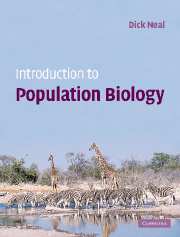Book contents
- Frontmatter
- Contents
- Preface
- Acknowledgements
- PART I Evolution by natural selection
- PART II Simple population growth models and their simulation
- PART III Population genetics and evolution
- PART IV Demography
- PART V Interactions between species, and the behaviour of individuals
- Glossary
- Solutions to problems
- References
- Index
Preface
- Frontmatter
- Contents
- Preface
- Acknowledgements
- PART I Evolution by natural selection
- PART II Simple population growth models and their simulation
- PART III Population genetics and evolution
- PART IV Demography
- PART V Interactions between species, and the behaviour of individuals
- Glossary
- Solutions to problems
- References
- Index
Summary
This introduction to population biology is based on a 13-week course I have taught at the University of Saskatchewan since 1979. When I developed the course I was inspired by Wilson and Bossert's 1971 book, A Primer of Population Biology, by Emlen's 1973 book, Ecology: An Evolutionary Approach and by Wilson's 1975 book, Sociobiology. It was a revelation to me how these three books used an evolutionary perspective to synthesize such areas as population ecology, population genetics and behavioural ecology, because I had been educated in a tradition where such subjects were taught separately.
Over the past decade I became increasingly frustrated in my attempts to find an appropriate text for my course. There are many superb texts available: encyclopedic texts on either ecology or evolution; more specific texts dealing with population ecology or population genetics or behaviour; and a few texts that cover two of these more specific areas, but to cover the breadth of material I teach would require using parts of two or three of these books. What is disappointing, however, is the lack of any evolutionary perspective in most of the ecology books. This is surprising given that Darwin used various principles of population biology to develop his theory of natural selection: the potential for geometric growth of population numbers, and the limitation of resources that leads to a struggle for existence through the effects of competition, disease, and predation.
- Type
- Chapter
- Information
- Introduction to Population Biology , pp. xi - xiiiPublisher: Cambridge University PressPrint publication year: 2003



